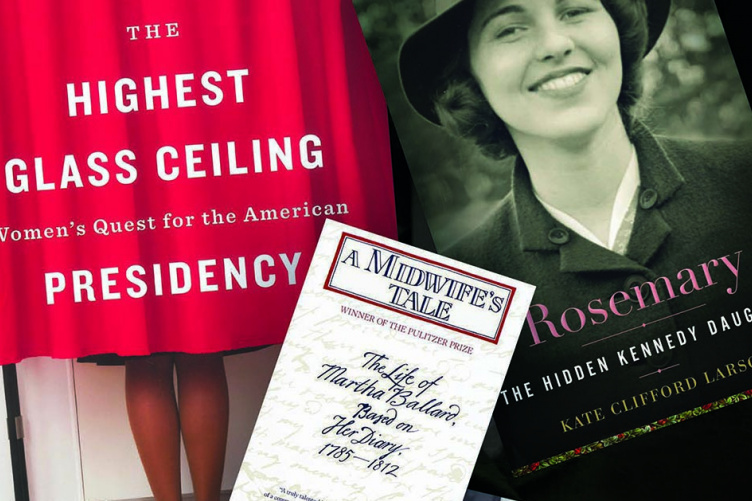
Notable honors. Carefully researched volumes that have claimed the national spotlight. World-renowned scholars.
These are just a few of the fruits of UNH’s history department. “We take pride in being a strong research department and a strong teaching department, and we work to marry the two together,” says Jan Golinski, professor of history and humanities and the department’s acting chair.
“Our scholarship helps make us dynamic and innovative teachers, even as our teaching enriches our scholarship,” adds professor Eliga Gould. “There really is no tradeoff between the two. I know I speak for my colleagues when I say I’d be much less effective as a teacher and a scholar if I didn’t get to do both.”
That balanced commitment is reflected in the success of faculty, students and alumni alike. In 2016, Gould received a prestigious Guggenheim Fellowship to complete his book about the little-studied Treaty of 1783, which ended the American Revolutionary War. Also last year, professor Ellen Fitzpatrick released “The Highest Glass Ceiling: Women’s Quest for the American Presidency” to national acclaim; its timely subject made Fitzpatrick, a regular commentator on PBS’s The NewsHour, a sought-after source for the national media during Hillary Clinton’s historic run for the presidency.
Similarly, associate professor Jason Sokol has embraced the “public intellectual” role. His 2015 “All Eyes Are Upon Us: Race and Politics from Boston to Brooklyn” provided historical grounding for racial tensions in places like Ferguson, Missouri, and Sokol shared his perspectives with major news media, including The New York Times and National Public Radio. Like Gould, Sokol received uncommon national funding — a public scholar grant from the National Endowment for the Humanities (NEH) — for his next book, “Shot Rings Out: How King’s Death Was Lived.” The NEH also supported associate professor Julia Rodriguez with a summer stipend in 2016 for a project that looks at the intersection of Latin American conquest and the history of science.
The history program’s reputation for excellence, while longstanding, was not accidental. “UNH’s current prominence in American history research is rooted in the university’s decision in the 1960s to develop a doctoral program focusing on Colonial American history,” says Robert Mennel, professor emeritus of history and humanities, who taught at UNH from 1969 through 2005. The key figures in those first decades included Darrett Rutman, an early advocate of quantitative history, and Charles Clark, whose book “The Eastern Frontier” attracted wide acclaim, as well as Trevor Colbourn, dean of the graduate school.
Mennel notes that the “next generation of scholars,” Gould and professor Jeffrey Bolster foremost among them, expanded the definition of Colonial American history to include Atlantic history. Bolster’s decorated 2012 book “The Mortal Sea: Fishing the Atlantic in the Age of Sail” won the Bancroft Prize and several honors from the American Historical Association, while professor Kurk Dorsey’s “Whales & Nations: Environmental Diplomacy on the High Seas” followed the maritime inquiry when it came out in 2014.

In 1976, while working on her doctoral dissertation, Laurel Thatcher Ulrich ’80G penned the popular phrase “Well-behaved women seldom make history.”
It’s not just books and awards the history department has generated: The program has produced prominent historians as well. Laurel Thatcher Ulrich ’80G, author of the Pulitzer Prize-winning “A Midwife’s Tale” and other books about early New England life, is a professor of history at Harvard University and received MacArthur and Guggenheim fellowships, and Kate Clifford Larson ’03G’s recent book, “Rosemary: The Hidden Kennedy Daughter,” has topped The New York Times bestseller list. Other alumni, like Hoboken mayor Dawn Zimmer ’90, Boston city councilor Tito Jackson ’99 and former New Hampshire governor Stephen Merrill ’69, have plied their training in public service.
Consistently ranked among the nation’s top programs for American history, the department continues to attract graduate students who peer into the past to shape their own academic futures.
“Our professors are extraordinary teachers, dedicated mentors and nationally recognized scholars,” says Amanda Demmer, a doctoral student advised by Dorsey on her project on the Vietnam War. “This rare combination is why students come from all over the country to pursue their doctorates in history at UNH.”
Patrick Lacroix, a doctoral student who works with Fitzpatrick as his advisor on his study of religion and public policy during the presidency of John F. Kennedy, echoes Demmer.
“My years as a graduate student in history at UNH have made me a better writer, teacher and thinker,” he says. “I have been continually impressed with the collegiality of the program and the academic support so generously provided by our faculty.”
History at UNH, clearly, has a bright future.
-
Written By:
Jennifer Saunders | Communications and Public Affairs | jennifer.saunders@unh.edu | 603-862-3585


















































